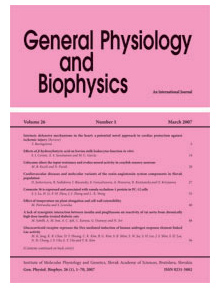General Physiology and Biophysics Vol.38, No.2, p.165–173, 2019
|
| Title: Ivabradine reduces baseline and stress-induced increase of heart rate and blood pressure and modulates neuroendocrine stress response in rats depending on stressor intensity |
| Author: K. Ondicova, N. Hegedusova, M. Tibensky, B. Mravec |
|
Abstract: Ivabradine, a selective inhibitor of the sinoatrial pacemaker, is used in clinical practice to reduce heart rate. However, its potential effect on the neuroendocrine stress response has not been investigated. Therefore, we determined the effect of administering ivabradine to rats on cardiovascular parameters and plasma levels of epinephrine, norepinephrine, and corticosterone. Ivabradine was administered intraperitoneally 30 min before exposing animals to either handling, restraint, or immobilization stress. Heart rate and blood pressure were monitored telemetrically. Blood samples were collected before, during, and after stressor exposure to determine the extent of the neuroendocrine stress response as reflected by plasma epinephrine, norepinephrine, and corticosterone levels. In animals pretreated with ivabradine, significantly lower values of heart rate and blood pressure were found during both the baseline period and during exposure to stressors, as well as during the rest period following stressor exposure. Ivabradine also significantly reduced handling-induced epinephrine and norepinephrine release into the bloodstream. However, ivabradine significantly potentiated restraint- and immobilization-induced increases of plasma epinephrine levels, whereas stress-induced changes in plasma norepinephrine and corticosterone levels were ambiguous. Our data shows that ivabradine significantly reduces blood pressure in rats during both baseline and stressful conditions, and also affects the neuroendocrine stress response. These findings show that viscerosensory signaling from the cardiovascular system may significantly modulate the neuroendocrine stress response.
|
|
| Keywords: Blood pressure, Corticosterone, Epinephrine, Heart rate, Ivabradine, Norepinephrine |
|
|
Published online: 25-Mar-2019
|
| Year: 2019, Volume: 38, Issue: 2 |
Page From: 165, Page To: 173 |
doi:10.4149/gpb_2018046
|
|
 download file download file |
|
|
|
|
 download file
download file
